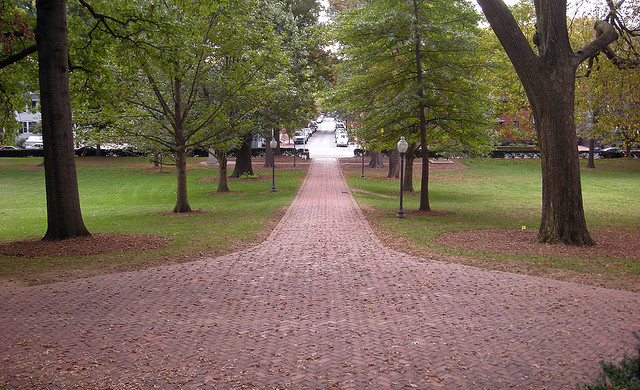 Page A13 of today's New York Times has an article about St. John's College, a rather unique Great Books program. The thrust of the article is to illustrate how St. John's professors -- referred to as "tutors" -- are expected to teach every discipline, regardless of their own specialty. As an example, the article features Dr. Sarah Benson, an art historian, who is currently teaching mathematics -- via Euclid.
Page A13 of today's New York Times has an article about St. John's College, a rather unique Great Books program. The thrust of the article is to illustrate how St. John's professors -- referred to as "tutors" -- are expected to teach every discipline, regardless of their own specialty. As an example, the article features Dr. Sarah Benson, an art historian, who is currently teaching mathematics -- via Euclid.
The Times article says "students who attend St. John's...know that their college experience will be like no other. There are no majors; every student takes the same 16 yearlong courses, which generally feature about 15 students discussing Sophocles or Homer."
I mention this article for two reasons. My daughter is a freshman at St. Johns College, and is finding the experience to be uniquely mind-expanding.
I can already hear the changes in her thinking; for example, in a recent telephone discussion about how her younger sister's classmates feel that American imperialism is in all cases justified, daughter #1 bursts out indignantly: "But what about Virtue? Don't they even consider that?"
In my mind, I laughed, then applauded.
The second reason is that this article brought back memories of my own undergraduate education, the School of Interdisciplinary Studies at Miami University (of Oxford, Ohio, thankyouverymuch). Cloistered on its own campus (the former Western College for Women, at which my mother was an assistant dean), the School of Interdisciplinary Studies taught us in much the same way that St. John's College trains my daughter today. Frequent, small discussion classes, only barely run by the professors, punctuated by more formal seminars, at which the academics of the College presented insights from their own disciplines, viewed through interdisciplinary lenses.
There was one class, however, which became for me an intellectual satori. I spent a semester studying the relationship between Picasso's Cubism and Einstein's theory of relativity.
It was team taught by a physicist and an art historian, and we all learned together, studying the works of Picasso and Georges Braque, and reading Einstein's original works. And somewhere, through the heat of that challenge, I emerged a changed man. Somehow, my lenses had shifted, and I never looked at the world in the same way again.
The School of Interdisciplinary Studies is long gone, replaced by a sub-department within a department, but I am glad to see that schools such as St. Johns College continue to educate men and women who will be capable of gazing out onto the landscape of culture and ideas and see things to which others are blind.
Dr. Avery Jenkins is a chiropractic physician specializing in the treatment of people with chronic disorders. He can be reached at alj@docaltmed.com or by calling 860-567-5727.